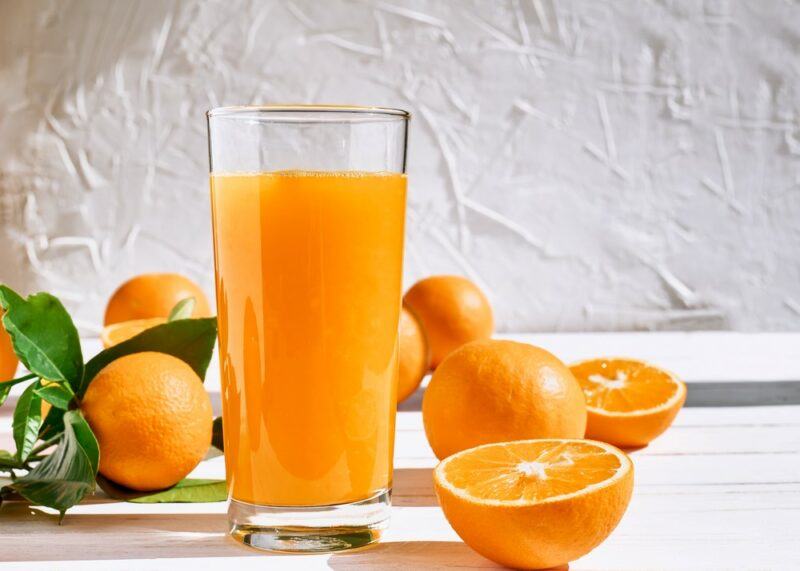
It’s easy to see orange juice as a health food. After all, it’s a natural product that contains plenty of phytochemicals, vitamin C, antioxidants, and other nutrients. If you squeeze the juice from oranges yourself, there aren’t any additives to worry about. Yet, we have to ask, is orange juice good for you?
Because, as popular as orange juice is, the beverage also has some serious limitations. You lose much of the fiber that you get with whole citrus fruit and end up with a drink that’s high in sugar.
To answer whether orange juice is healthy or not, we need to take a close look at the good features and the bad ones, then see how these balance out. After all, it’s important to know whether orange juice helps you or whether you’re better off sticking to drinks like coconut water, lemon water, and plain old water.
Is Orange Juice Good For You?
- Benefits Of Orange Juice
- The Problems With Orange Juice
- Does Orange Juice Improve Your Immune System?
- Orange Juice And Inflammation
- Which Types Of Orange Juice Are Best?
- Is Orange Juice Better Than An Orange?
- Should You Drink Orange Juice?
Benefits Of Orange Juice

A Source Of Nutrients And Antioxidants
Orange juice contains many of the same nutrients that you find in oranges, including vitamin C, vitamin A, potassium, folate, and calcium. These nutrients all help to promote health.
Vitamin C, for example, is often linked to immune system improvements, along with iron absorption, the maintenance of tissues throughout your body, and the creation of collagen. Folate is most well-known for its importance in pregnancy, but it has other functions too, like promoting the healthy growth of cells and the formation of red blood cells.
We can’t forget the antioxidants either.
As the name suggests, antioxidants help to fight oxidation in the body. This is an important effect, as too much oxidation may increase your risk of disease. An antioxidant rich diet could promote health in a variety of ways and perhaps even help you to live longer. How’s that for good news?
Helps To Keep You Hydrated
Orange juice mostly consists of water, so it can help to keep you hydrated. This is an important effect, as being dehydrated puts your health at risk, while also lowering your energy and making it more difficult to concentrate.
The sugar in orange juice may even be helpful in some situations, such as for athletes needing to recover after intensive exercise. Plus, many people find orange juice to be tastier and more enjoyable than plain water. This could be a useful effect for helping people stay hydrated when they’re resistant to drinking water.
Of course, there are better ways to stay hydrated, including plain water. The high calorie content of orange juice means that you can’t just rely on the juice to keep you hydrated either. You’ll need to drink water as well.
There May Be Unknown Benefits
There is still ongoing research into 100% fruit juice and plenty of gaps in our knowledge. Researchers suspect that there may be some benefits to the fruit juice, especially as there are so many plant-based compounds present.
This may mean that 100% orange juice could have effects like decreasing the risk of heart disease, cancer, or hypertension, improving cognition, or fighting inflammation. However, those benefits are just theoretical at this stage. They may be present or they may not be.
Could Prevent Kidney Stones
Orange juice does have one interesting benefit – the ability to reduce kidney stone risk. This effect is partly because the juice can increase the pH of your urine, making it a less acidic environment. This then means that kidney stones are less likely.
Plus, orange juice contains plenty of water. That matters too, as staying hydrated also lowers kidney stone risk. While the area hasn’t been studied extensively, one study found that orange juice was better than lemonade at lowering kidney stone risk, while another showed a link between orange juice and lower risk of kidney stones.
The Problems With Orange Juice

Lots Of Sugar
Orange juice is high in sugar. You end up with roughly 20 grams of sugar per 8-ounce serving. The amount varies a little depending on the brand that you choose but, either way, you’re getting a lot of sugar.
That’s not all. Some companies add extra sugar to make the drink sweeter. This can kick up the sugar content even further and the extra sugar provides no benefits at all.
The sugar in pure orange juice is natural and in the form of fructose. This could, theoretically, be healthier than processed added sugars, but there’s still a lot that we don’t know.
Regardless, sugar clearly contributes to many health problems, including obesity and increased risk of some health conditions. As such, it’s important to be careful with your sugar intake – even when that sugar comes from fruit and fruit juice.
High In Simple Carbs
The amount of sugar in orange juice means that the beverage is also high in simple carbs. While complex carbs can help to improve your health, simple carbs don’t have the same effect. They mostly act as a fast source of energy.
Quick-release energy can sometimes be useful, but the blood sugar spike you get is often more harmful than helpful. The carb content also makes orange juice a poor choice for most low carb and keto dieters.
Orange juice is a common addition to breakfast, which highlights another problem. Breakfast is one of the worst times to consume lots of simple carbs, as you end up with a sugar spike soon after, then a crash during your workday,
May Promote Weight Gain
Orange juice can be a problem for your weight in a couple of ways. First, it’s high in calories. You get around 110 calories per 8-ounce serving of orange juice and many of us consume more than that in a serving.
In fact, if we’re just looking at calories, orange juice isn’t actually that different than soda. And, just like soda, we’re talking about liquid calories. Our bodies don’t experience the same satisfaction responses when we drink our calories compared to when we eat them.
Because of this, it’s very easy to overdo it with calorie-rich drinks like orange juice. You might easily reach for a second glass (or even a third!), especially if you’ve always seen orange juice as a healthy drink.
It’s also surprisingly easy to forget about our drinks when we calculate the calories that we’re eating every day. This could be a serious issue for your weight.
The Nutrient Content Isn’t That Amazing
Orange juice gives you more nutrients and antioxidants than soda. Plus, those nutrients are all natural, rather than being added in like you see with Gatorade and many protein shakes.
These features are why orange juice is said to be much healthier than soda. Yet, nutrients and even antioxidants are only helpful if your body needs them. If you’re already getting plenty of what orange juice offers from other sources, then the juice really is adding to your calorie intake without offering many benefits at all.
Does Orange Juice Improve Your Immune System?

Orange juice is often chosen to help boost immunity. Perhaps you want to decrease your chances of getting a cold or want to recover from one faster. There’s even been a surge in orange juice sales since COVID-19. This effect seems to be due to the same idea – that orange juice will boost your immune system.
So, does it?
In some ways, it could. Orange juice does contain decent amounts of vitamin C, vitamin A, and antioxidants. Studies have even shown that many of the compounds in orange juice can, at least in theory, help with some aspects of immune system function.
There’s a problem though. Most of those studies don’t consider orange juice itself. They just look at the individual nutrients. For that matter, much of the research into vitamin C, colds, and the immune system has looked at vitamin C supplements, rather than food sources of vitamin C.
Those nutrients are hardly exclusive to orange juice. You can find them in many other foods and drinks. If your diet is even somewhat balanced, you should already be getting all the vitamin C, vitamin A, and antioxidants that you need for an immune system that functions well.
Then there’s the sugar. This doesn’t just promote weight gain. Spikes in your blood sugar levels can actually temporarily suppress your immune system. And, orange juice is likely to cause blood sugar spikes, as it’s often high in sugar and low in fiber.
You could minimize the issues by choosing natural orange juice with no added sugar and extra pulp. But, even then, there are plenty of better choices for improving your immune system. Why not look for vitamin C rich foods that aren’t high in sugar?
Orange Juice And Inflammation
Inflammation is another debatable area. Here too, the various compounds in orange juice can potentially help to decrease inflammation, which may then lower your risk of some diseases.
You’ll even see oranges and orange juice included in some lists of anti-inflammatory foods. But, there’s still the same problem here – the sugar. Sugar is one of the worst culprits for inflammation.
Few studies have directly looked at whether orange juice increases or decreases inflammation, so we don’t know how the pro-inflammatory and anti-inflammatory features balance out. But, even if orange juice does lower inflammation, there are plenty of better anti-inflammatory foods out there.
In fact, oranges themselves are a more powerful choice for decreasing inflammation and boosting your immune system. You get much more fiber when you choose to focus on the whole fruit.
Plus, it takes longer to eat a whole orange than to chug a glass of orange juice, so there’s less risk that you’ll overdo it.
Which Types Of Orange Juice Are Best?

You’ll get the most benefits by focusing on freshly squeezed orange juice – ideally orange juice that you’ve squeezed yourself. This gives you the freshest possible juice, which means you’re getting the most possible nutrients and antioxidants.
Squeezing the juice yourself has another benefit too, you can be certain that you’re drinking orange juice and nothing more. That’s an important distinction, as you can never be sure exactly what companies put in their products.
Besides, fresh orange juice always tastes better than anything out of the bottle. This is why orange juice cocktails are so much better with freshly squeezed orange juice.
If you’re going to buy bottled orange juice instead, look for brands that use minimal processing and aren’t made from concentrate. Also be aware that companies can still use the term ‘fresh’ on their packaging even if their orange juice is pasteurized. Still, even if you choose your juice well, it will have been sitting around for a while and is likely to contain fewer nutrients than any juice you squeeze at home using a juicer.
What About Fortified Orange Juice?
Some orange juice products are fortified with extra nutrients, like calcium or vitamin D. Fortified juice can be useful if you’re not getting enough of that nutrient elsewhere.
However, fortified foods and drinks aren’t that different than taking a multivitamin. You’re likely to absorb the nutrients better when you get them from natural food sources, rather than when they’re artificially added into products.
Is Orange Juice Better Than An Orange?
An 8-ounce serving of orange juice is roughly equivalent to 2 oranges. This makes orange juice a more concentrated source of nutrients.
From that perspective, orange juice might seem like a healthier choice. However, orange juice contains more sugar and more calories per serving too, so it isn’t the winner that it first seems to be.
Don’t forget about the fiber either. Oranges are a good source of fiber, which helps to stabilize your blood sugar. This is why you’ll often see a stronger blood sugar spike from orange juice than from whole oranges.
Some orange juice products contain very little fiber, as the pulp is strained out. Others include the pulp or even add extra, which increases their fiber content. But, even then, you’ll get more fiber from a whole orange than from a glass of orange juice.
Then there’s the time factor to think about as well. Eating a whole orange isn’t a fast process while drinking a glass of orange juice takes barely any time at all.
This difference, combined with the fiber, explains why you’ll often feel satisfied after eating an orange. That effect doesn’t happen with orange juice. Instead, it’s far too easy to reach for another glass of orange juice.
Should You Drink Orange Juice?

While there are plenty of issues with orange juice, it does contain more nutrients and antioxidants than soda. Orange juice is relatively unprocessed too, especially if you choose products that aren’t from concentrate (or squeeze the juice yourself).
The combination of nutrients and antioxidants in orange juice could even boost your immune system and promote health in other ways. But, don’t hold your breath yet – as orange juice really is high in sugar and the amount of nutrients isn’t that amazing.
In the end, orange juice is no health tonic. It’s better than some alternatives (like soda) and worse than others (like water or lemon water).
If you are going to drink orange juice regularly, try viewing it as a treat and something to be enjoyed – rather than as something to make you healthier. This should help you to keep your portions under control and avoid excessive sugar intake.
You could also try using orange juice as an ingredient, rather than drinking the juice on its own. For example, a little orange juice might add just enough sweetness to a green smoothie or a combination of green juices. With just a little planning, you could easily end up with a drink that’s lower in calories than orange juice, with more nutrients to boot.
Frequently Asked Questions
How Much Sodium Is In Orange Juice?
Orange juice tends to be low in sodium, often just containing 2 mg of sodium per cup. This isn’t surprising, as oranges themselves aren’t high in sodium.
However, it’s important to check the ingredients label closely, as some products are higher in sodium than others. Orange juice prepared from concentrate is a particular problem and may give you around 5 mg of sodium in a serving rather than just 2 mg.
Is Bottled Orange Juice Good For You?
Fresh orange juice will always be the best choice. This is the richest in antioxidants and contains the fewest additives.
Bottled orange juice still contains some nutrients from oranges, so it may have some benefits. However, it’s important to look for high-quality products that don’t rely on orange juice from concentrate. Check out the ingredient labels too. The best orange juice should contain oranges, water, and little else.
Is Fermented Orange Juice Good For You?
First of all, let’s make a distinction. You shouldn’t ever drink spontaneously fermenting orange juice (like an opened bottle of juice that you left for far too long). This isn’t wise at all, as the bacteria is likely to cause harm.
However, you can intentionally ferment your juice by using a healthy bacterial starter. Doing so gives you a slightly fizzy drink that tastes good and is full of probiotic benefits.
Is SunnyD Good For You?
SunnyD is an interesting case, as it’s not real orange juice at all. The main ingredients are water and high fructose corn syrup. There are also additives, including natural flavors, artificial colors, artificial sweeteners, and stabilizing ingredients. Only 5% of the total drink is juice. Some of this is orange juice, but there’s apple, lime, grapefruit, and pear in the mix as well.
So, is it healthy? Absolutely not. It is far too processed to do you any good. The only benefit is that it’s lower in sugar than actual orange juice, but that’s only because they’re using artificial sweeteners.
Seriously. It’s best to skip SunnyD entirely.
How Much Sugar Is In Orange Juice?
The sugar content of orange juice varies slightly depending on the oranges used and whether any sugar is added. However, for an 8 oz cup of the juice, you’re normally looking at around 20 grams of sugar.
To put this in context, some recommendations suggest that men have no more than 36 grams of added sugar per day and women no more than 25 grams (and yes, orange juice still counts as added sugar in this context).

















 11 Spices for Mac and Cheese with 11 Comforting and Delicious Recipes
11 Spices for Mac and Cheese with 11 Comforting and Delicious Recipes
Leave a Reply